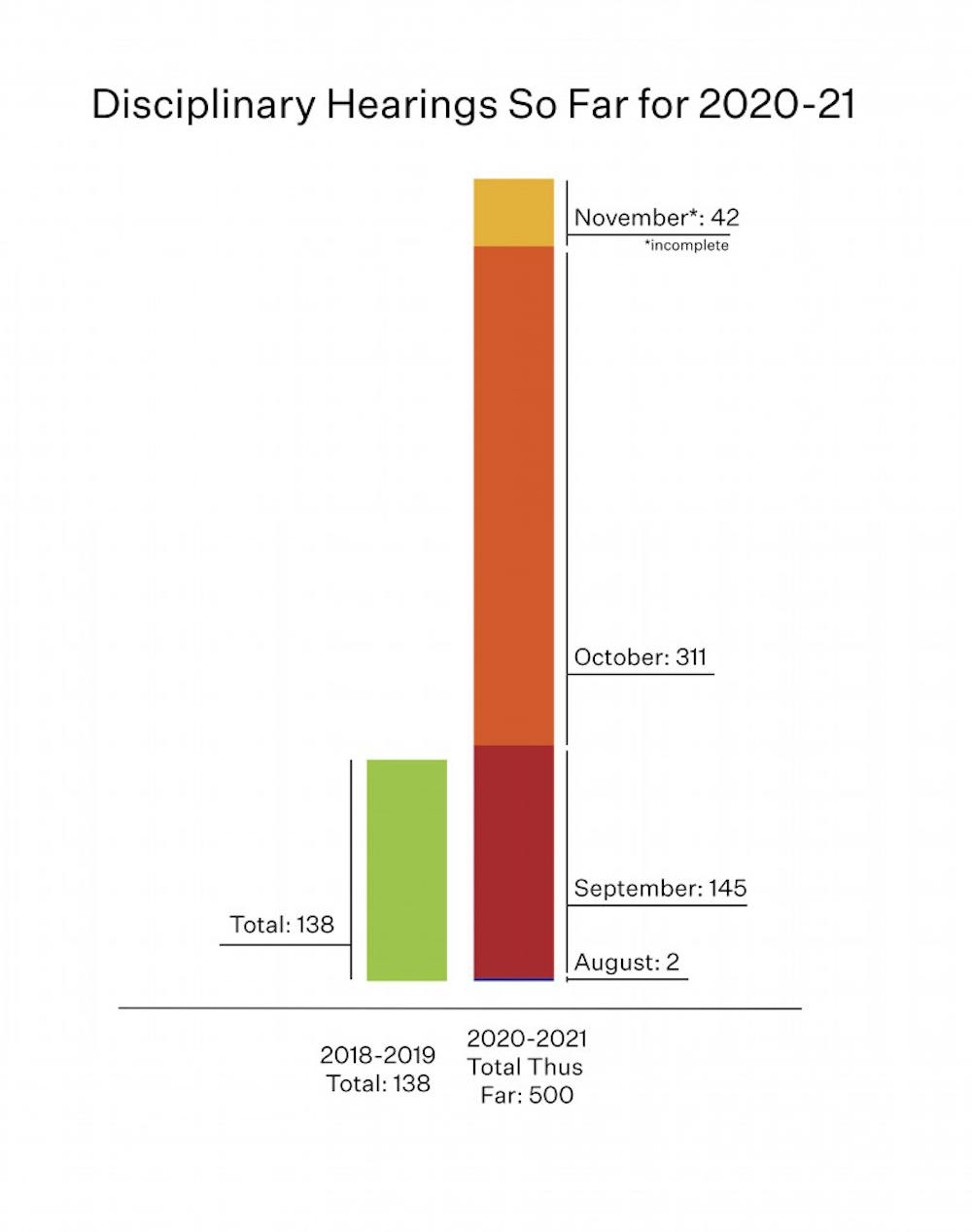As students face additional conduct regulations per state and University COVID-19 guidelines, total disciplinary actions taken against undergraduate students have risen sharply this fall compared to past semesters. 500 total disciplinary hearings have been conducted to date this semester.
The number of monthly disciplinary cases so far this semester is roughly equivalent to the total yearly disciplinary cases in recent years, said Yolanda Castillo-Appollonio ’95, senior associate dean of students and director of student conduct and community standards.
The vast majority of the 500 cases are categorized as lower-level hearings, which are conducted for “matters that will not result in a community status of suspension” or expulsion, according to the 2019-20 academic year Student Conduct Procedures.
If multiple students are charged with the same offense, each student is counted as their own case. The dataset for this year’s cases to date reviewed by The Herald also excludes cases that were withdrawn upon investigation.
In the 2018-19 school year, the University saw a total of 138 disciplinary hearings, most of which were also lower-level, according to the Student Conduct & Community Standards Annual Report for 2018-19. The report for the 2019-20 academic year has not yet been released.
But Castillo-Appollonio emphasized that this year’s disciplinary data so far reflects the unique circumstances of the pandemic, which has led to stricter regulations and a subsequent increase in disciplinary cases. “I’d say this is not like years prior at all, and we’re using a different set of procedures for COVID-related violations as well,” Castillo-Appollonio said. “It’s a completely different type of situation.”
The nature of the pandemic has also changed how disciplinary cases are brought against students.
Among students living in off-campus housing at the start of the semester, several issues surrounding “noise complaints and gatherings” were counted among this semester’s cases and led to an increase in educational conversations, Castillo-Appollonio said. In these conversations, groups of students meet virtually with an administrator for a non-disciplinary discussion about why their behavior is of concern, according to the COVID-19 Student Conduct Procedures website.
One student, who wished to remain anonymous due to ongoing disciplinary proceedings, told The Herald they attended a party in a residence hall on campus with approximately 10 other students that was shut down by the Department of Public Safety. According to the student, DPS took the host’s name, and a week later, in a dean’s meeting, the host provided the names of the other attendees. The student said they received an email from a dean a few days later.
The student added that they disliked the way the case was handled, as the DPS officer “did not knock” before entering the dorm and “also went into (the host’s suite-mate’s) room without knocking,” they said.
While the student does not plan on appealing the case, they wished the dean had “been a little clearer through (their) emails about what was going to happen,” as they said a full week elapsed between receiving an initial communication and hearing back about next steps, the student said. Castillo-Appollonio did not respond to request for comment on the incident.
“I also think that DPS in the future should take down the names of everyone who’s at the gathering rather than waiting for the host to first have a meeting with the dean and then give the names,” they said.
DPS did not respond to requests for comment.
Issues concerning testing — such as failing to get tested once every four days per University guidelines for students living in Providence — have also led to an increase in students receiving a Letter in Lieu of Review Meeting, where students can accept responsibility and get reprimanded or meet with a dean, Castillo-Appollonio said.
Multiple reports in September of athletes violating Brown and state COVID-19 guidelines also prompted the University to hold a mandatory COVID-19 town hall for student-athletes.
That same month, several students studying remotely for the fall semester erroneously received emails from the University alleging they had been in the Providence area despite indicating that they would be studying remotely away from College Hill, violating the Code of Student Conduct. The majority of these cases were withdrawn upon disciplinary investigation.
Those students received emailed allegations of misconduct shortly after President Christina Paxson P’19 sent a campus-wide email urging students registered as studying remotely but staying in the Providence area to enroll in the University’s testing program, per University guidelines.
Students were identified by several factors, namely indications of accessing campus facilities or networks, as well as reports from other community members, The Herald previously reported.
One student, who requested anonymity for fear of personal repercussions, received such an email when they were studying in Europe at the time and opted for a meeting with a dean to appeal the violation. During the meeting, the dean said that they had tracked the student’s IP address during the call — confirming that they were not, in fact, studying in Providence — and then dismissed the charge.
The student studying in Europe also felt that the process lacked transparency and clarity, and found the University’s location tracking to be a privacy violation. “It felt really weird to know the school knew what I was doing or where I was regardless of whether I was on campus or not just through accessing Brown platforms,” they said. “It made me a bit wary of even returning in the spring, honestly.”

Jack Walker served as senior editor of multimedia, social media and post- magazine for The Herald’s 132nd Editorial Board. Jack is an archaeology and literary arts concentrator from Thurmont, Maryland who previously covered the Grad School and staff and student labor beats.





